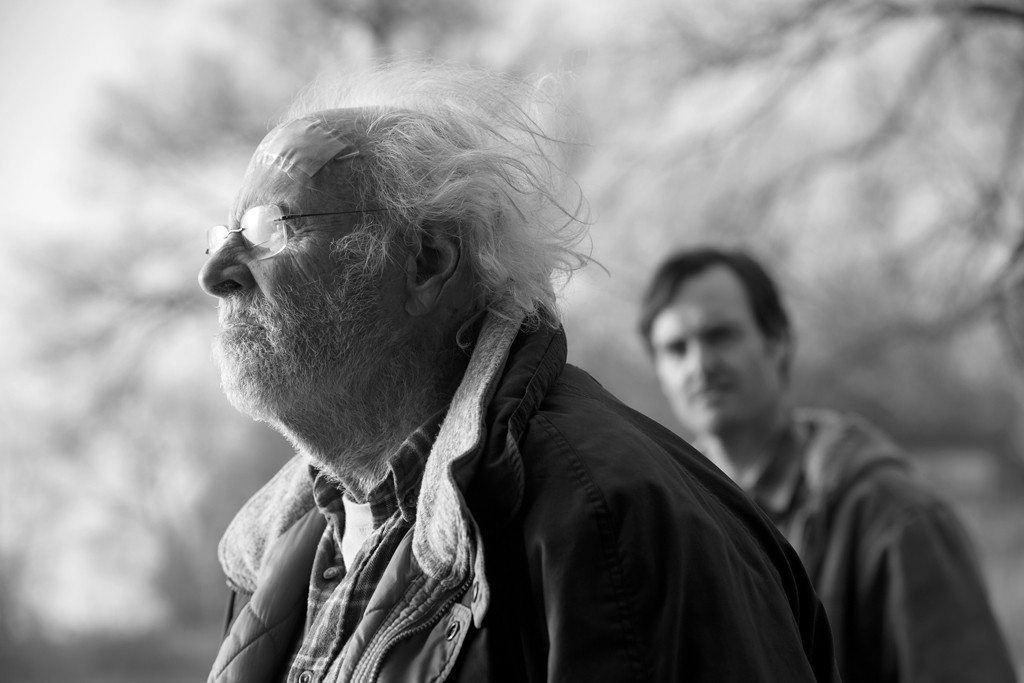Nebraska
Director: Alexander Payne
Cast: Bruce Dern, Will Forte, June Squibb
Length: 110 minutes
Country: USA
Dusty-white farmhouses, dark bars lined by leather-faced men. Backwater America is a simple and hardy place, peppered with salt-of-the-earth types. But this is no romantic idyll — at least, not in Alexander Payne’s latest film Nebraska. In the backwaters depicted here, there seems to be salt in the earth. Everything looks a little starved. Certainly, the old hinterland-hometown of the protagonist, Woody, has seen better days. So when Woody stops by, claiming to be on a journey to collect prize money of one million dollars, ears inevitably begin to prick.
Nebraska is an understated comedy-drama, telling the story of a man falling into senility. Played by Bruce Dern, Woody is a sight to behold — stooped-back, unkempt beard, flailing white hair. He looks like a down-and-out Santa Claus — and Woody really is down-and-out. He has a house, but nowhere he really calls home, and is more at ease with a bottle than his wife or sons. He receives a dodgy coupon in the post saying he’s become a millionaire, telling him to go to Nebraska to claim his prize. After several failed attempts to make the 800-mile journey on foot, one of Woody’s sons, David (Will Forte), reluctantly agrees to drive him.
Initially, Nebraska feels a bit aimless. The first chunk of the movie plays like an art-house road movie, with writer Bob Nelson noodling along in deliberate low gear. We pass from vignette to vignette, watching a column of bikers overtake David’s Subaru here, making a brief excursion to Mount Rushmore there. Nebraska is minimalist throughout, but particularly so in the beginning. Here, with the plot so scattershot, and the humour so understated, attention is drawn primarily to the vast Midwestern vistas. Make no mistake — elegantly shot in black and white, the scenery is impressive to behold and a testament to the skill of cinematographer Phedon Papamichael. But with focus squarely on the surroundings, and the narrative so frugal, Nebraska — in its early stages — verges on becoming some Ansel Adams-inspired exercise in landscape documentation. The effect of all this minimalism is the inculcation of a certain bleakness and emptiness: a sense of wispy inessentiality, almost cheekily challenging you to stay in your seat.
Nebraska is a pleasure: an unconventional odyssey against the backdrop of a forgotten rural Midwest.
But as the film progresses, the cinema exit becomes a distant memory. Woody is forced to stop off in his old hometown, and here the film picks up. Nebraska’s warts-and-all characters start to come to life amid exquisite snapshots of kindness, vindictiveness and sadness — from Woody’s two sons attempting to steal back an old compressor to console their dad (a former mechanic), to the reminiscences of Woody’s sharp-tongued wife Kate (superbly played by June Squibb) as she wanders around the graves of dead friends and relatives. In the hands of another director, these episodes could have come across a little gooey, but set against the bleakness Payne establishes in the film’s first 30 minutes, the result is something genuinely heart-warming.
What really holds this all together is Dern’s performance. Dern expertly exudes a foreign otherness without ever becoming totally alien. Dern’s Woody is a fascinating creature to behold: a man teetering on the brink of total decrepitude. We’re never quite sure if we’ll lose Woody, and that’s a tension hovering in Nebraska’s background throughout. Meanwhile, Forte is superb as David, excellently juggling the heart-wrenching and the rib-tickling in his back-and-forths with Dern, and Bob Odenkirk (of Breaking Bad fame) puts in a top performance as Woody’s other son Ross. Woody’s assortment of brothers, sat po-faced and glued to the television set, lend another dimension to the film’s understated humour, as do Woody’s troll-like nephews (played by Devin Ratray and Tim Driscoll), who possess conversational skills of the most limited kind.
Ultimately, Nebraska is a pleasure: an unconventional odyssey against the backdrop of a forgotten rural Midwest. It took me a while to get into, but the emotional sincerity of the film won me over. As it unfurls, Nebraska encourages us to see through Woody’s eyes, and to appreciate the value of family bonds. But thanks to Nebraska’s stark emotional and geographical landscapes, the message never cloys. Stick with it, and you’ll find yourself enjoying a picture sentimental in all the right ways.

Comments